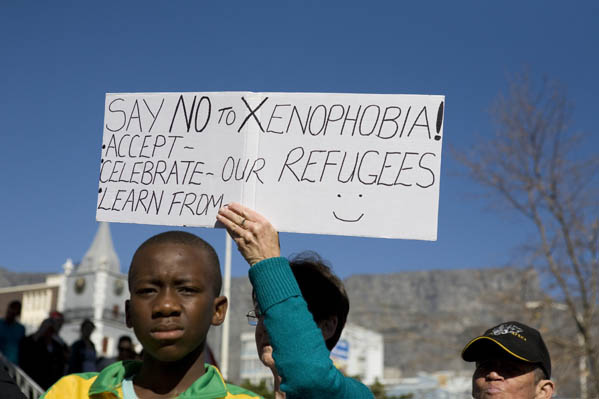South Africa has a fatal history of violence against foreign nationals, particularly other Africans. In May 2008, 62 people died as a result of nationwide xenophobic riots that started near Johannesburg, and in April 2015, seven people were killed in similar protests in Durban.
In 2020, the hashtag, #PutSouthAfricansFirst began to drive a mass of xenophobic conversations on Twitter. We should not kid ourselves that online hate will stay online – several incidents abroad have shown that when online hate goes offline, it can be deadly.
In collaboration with Code for Africa (CfA),The Daily Vox has put together a summary of the trending hashtag’s highest impact on Twitter and in public spaces.
The tweet below, posted on February 4 2020 was the first tweet to use the hashtag, #PutSouthAfricansFirst. However, it was the only tweet posted on that day up until April 27 2020 when the second tweet (technically the first to spark the hashtag to trending topics on Twitter) was posted.
Letshela Mofokeng @SirLetshela
This are South African Citizens waiting to register security qualifications with @PSiRALive and collect they membership.
…meantime illegal immigrants are working without and qualifications and no background check.
#Zuma #Northcliffchallenge #PutSouthAfricansFirst https://pbs.twimg.com/media/EP7T5PaXUAAzjd3.jpg
Twitter | 4 Feb 2020 (141 kB)
The second and third tweets below were tagging (and seemingly responding to a tweet from) account @uLerato_pillay. The tweet has since been deleted by the user.
charity begins at home#PutSouthAfricansFirst
— Sigebemuso (@sigebemuso) April 27, 2020
I agree that we must #PutSouthAfricansFirst
— TSHEPO (@MalumeSharepart) April 27, 2020
The @uLerato_pillay account was the focus of a DFRLab investigation published on 3 July 2020. Further investigations published on 23 September 2020 confirmed that Sfiso Gwala, a dismissed member of the South African National Defence Force and a member of South African First (SAF) political party, used the @uLerato_pillay account to foment xenophobic violence against foreign nationals and refugees living in South Africa. This account tweeted and retweeted using one of several nationalist pro-South African hashtags including #PutSouthAfricansFirst, #ZimbabweansMustFall, #NigeriansMustGo, #InfluxOfImmigrantsMustStop, #XenophobiaSeMoer, #Sidikiwe and #23SeptemberCleanSA.
#PutSouthAfricansFirst and #WeWantOurCountryBack drove a mass of xenophobic conversations on Twitter, one leading up to a protest march in Pretoria on 23 September. The hashtag #23SeptemberCleanSA trended on Twitter. The #PutSouthAfricansFirst movement planned to march to the Nigerian and Zimbabwean embassies to demand that foreign nationals be deported. After all the hype, a Daily Maverick reporter on the scene counted about 50 people taking part in the march.
#PutSouthAfricansFirst and #WeWantOurCountryBack featured first and second respectively in the list of top 10 trending hashtags. The hashtag had 73.7K mentions from 8.97K users on Twitter with 168 millions impressions and a 9.41 million reach.
South Africa and the United States of America featured first and second respectively in the list of top 10 locations.
Section 16(1) of the South African constitution protects the freedom of expression; however, it places a limitation on speech that “propagates for war; incites imminent violence; or advocates hatred that is based on race, ethnicity, gender or religion, and that constitutes incitement to cause harm”. This is in line with international law, particularly Article 19 and 20 of the International Covenant on Civil and Political Rights (ICCPR). Accounts such as @uLerato_pillay and nationalist pro-South African hashtags spread hate online. South Africa’s Hate Speech Bill explicitly criminalises the distribution of hate speech through electronic means. The manner in which information is published and shared electronically makes prosecution for electronic distribution vulnerable to selective application, which undermines the rule of law. We need to develop a multi-layered approach to fight the root causes of hate speech, racism, and discrimination.
Featured image: Wikimedia Commons









